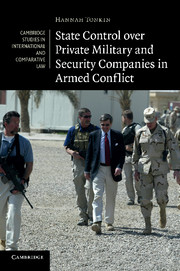Book contents
- Frontmatter
- Contents
- Acknowledgements
- Abbreviations
- Table of cases
- Table of statutes
- Table of international treaties and conventions
- Introduction
- 1 The private security industry uncovered
- 2 State obligations and state responsibility
- 3 The attribution of PMSC conduct to the hiring state
- 4 Obligations of the host state
- 5 Obligations of the hiring state
- 6 Obligations of the home state
- Conclusion
- Bibliography
- Index
- References
4 - Obligations of the host state
Published online by Cambridge University Press: 05 October 2012
- Frontmatter
- Contents
- Acknowledgements
- Abbreviations
- Table of cases
- Table of statutes
- Table of international treaties and conventions
- Introduction
- 1 The private security industry uncovered
- 2 State obligations and state responsibility
- 3 The attribution of PMSC conduct to the hiring state
- 4 Obligations of the host state
- 5 Obligations of the hiring state
- 6 Obligations of the home state
- Conclusion
- Bibliography
- Index
- References
Summary
International law imposes a number of obligations on states to take positive steps to prevent, investigate, punish and redress private misconduct in their territory. These obligations derive from the fundamental principle of state sovereignty: since every sovereign state is presumed to exercise exclusive control over its territory, it is also presumed to possess some capacity to control private acts committed in its territory in order to ensure that they accord with international law. It follows that the host state of a PMSC – that is, the state in which the company operates – will be obliged to take certain active measures to control company behaviour in armed conflict.
- Type
- Chapter
- Information
- Publisher: Cambridge University PressPrint publication year: 2011

